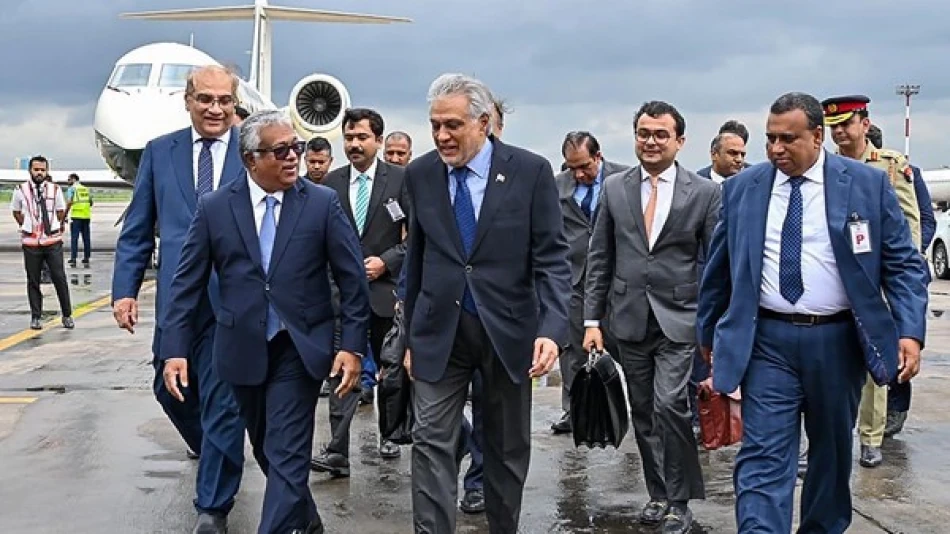
Pakistan and Bangladesh Explore Bilateral Cooperation and Regional Issues
Pakistan's Historic Diplomatic Reset: Foreign Minister Visits Bangladesh Amid Regional Realignment
Pakistani Deputy Prime Minister and Foreign Minister Mohammad Ishaq Dar arrived in Dhaka Saturday for a landmark two-day official visit to Bangladesh, marking a significant diplomatic breakthrough between two nations whose relationship has been strained by decades of political tensions and economic competition. The visit, coming at Bangladesh's invitation, signals both countries' recognition that regional cooperation may be essential for navigating an increasingly multipolar world.
High-Level Reception Underscores Diplomatic Importance
Dar's reception at Hazrat Shahjalal International Airport reflected the visit's strategic significance. Bangladesh's Foreign Ministry Secretary General Ambassador Asad Alam Siam personally greeted the Pakistani minister, alongside Pakistan's High Commissioner to Dhaka Imran Haider and Bangladesh's High Commissioner to Islamabad Mohammad Iqbal Khan. The presence of senior diplomatic officials from both sides suggests careful choreography aimed at projecting unity and shared purpose.
Strategic Meetings Point to Economic Focus
The Pakistani foreign minister's agenda includes crucial meetings with Bangladesh's interim leadership, notably Chief Adviser Professor Muhammad Yunus, Foreign Affairs Adviser Mohammad Touhid Hossain, and Commerce Adviser S.K. Bashir Uddin. This lineup indicates that economic cooperation and trade expansion are likely central to discussions, particularly given Bangladesh's recent political transition and Pakistan's ongoing economic challenges.
Yunus Factor: Nobel Laureate's Regional Vision
Professor Yunus's involvement is particularly noteworthy. The Nobel Peace Prize winner's expertise in microfinance and development economics could provide a framework for innovative bilateral cooperation models. His international credibility may also help legitimize any agreements reached during this visit, potentially attracting third-party investment or multilateral support for joint initiatives.
Regional Context: South Asian Integration Gains Momentum
This diplomatic engagement occurs against a backdrop of shifting regional dynamics. Both Pakistan and Bangladesh face similar challenges: climate vulnerability, economic pressures, and the need to balance relationships with major powers including China, India, and the United States. Unlike the UAE's aggressive economic diversification or Singapore's tech-focused strategy, South Asian nations are exploring more traditional diplomatic and trade-based approaches to regional integration.
Beyond Bilateral: Addressing Shared Global Challenges
The Pakistani Foreign Ministry's statement emphasizing discussions on "regional and international issues of mutual interest" suggests the talks will extend beyond bilateral trade. Both countries are grappling with similar pressures: managing relationships with neighboring India, addressing climate change impacts, and navigating global supply chain disruptions. Coordinated positions on these issues could enhance both nations' diplomatic leverage.
Economic Implications: Trade Corridor Potential
For investors and businesses, this diplomatic warming could unlock significant opportunities. Pakistan's textile industry and Bangladesh's garment manufacturing sector could benefit from reduced trade barriers and coordinated export strategies. Additionally, both countries' strategic positions—Pakistan's access to Central Asian markets and Bangladesh's Bay of Bengal ports—could create complementary trade corridors that bypass traditional regional bottlenecks.
The timing is particularly relevant as global supply chains continue reshaping post-pandemic. Companies seeking alternatives to traditional manufacturing hubs may find renewed Pakistan-Bangladesh cooperation offers attractive options for diversified production and logistics networks.
Historical Precedent: Learning from Past Reconciliations
This visit echoes successful diplomatic resets elsewhere in South Asia, particularly the periodic warming of India-Pakistan relations during economic crises. However, the Pakistan-Bangladesh dynamic carries less historical baggage than some regional relationships, potentially allowing for more pragmatic, economically-driven cooperation. The involvement of technocratic leaders like Yunus suggests a focus on practical outcomes rather than symbolic gestures.
Success here could establish a template for broader South Asian cooperation, demonstrating that economic necessity can overcome political differences when managed by experienced diplomatic and economic leadership.
Most Viewed News

 Layla Al Mansoori
Layla Al Mansoori






